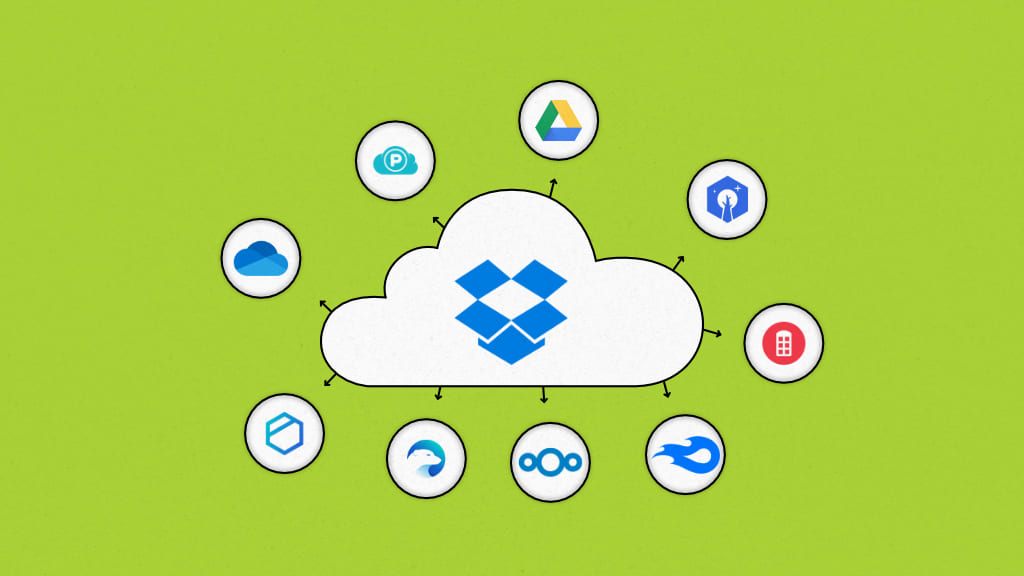Dropbox is a cloud storage service that lets you store your photos, videos, and documents online. It offers 2GB of free storage space for your first year. Dropbox is pretty great, but it is not the right fit for many of you. There are better alternatives to Dropbox that are more secure and offer a wider variety of features.
Dropbox is undoubtedly one of the most popular cloud storage solutions right now, with over 600 million customers globally. It allows users to share files with other people by sharing folders or individual files with others and sending links to specific files or folders.
Dropbox also makes it easy to collaborate on projects with colleagues or clients using its shared folder feature, which allows multiple people to work on the same document simultaneously in real time without worrying about who has made changes since the last time they looked at it.
What is Dropbox?
Dropbox is a cloud-based file management service that allows users to store all their important files, documents, and images at a single location and access them from any device synced up to the internet. You can use Dropbox for work as well as for personal use. Users can quickly share and collaborate on files and other documents, even with those who don’t have a Dropbox account.
Dropbox offers several plans with different pricing and storage options:
- Plus Plan: $9.99/user/month for 2 TB of encrypted storage.
- Essentials Plan: $16.58/user/month for 3 TB of encrypted storage.
- Business Plan: $15/3 users/month for 9 TB of encrypted storage.
- Business Plus Plan: $24/3+ users/month for 15 TB of encrypted storage.
19 Powerful Dropbox alternatives worth your consideration in 2026
1. pCloud
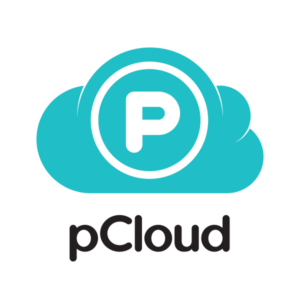
With client-side encryption and zero-knowledge privacy, pCloud delivers Swiss data security as a Swiss corporation. Because the encryption happens before your data is uploaded from your device to pCloud’s servers, the client-side encryption feature secures your files from unauthorized access.
On the other hand, the zero-knowledge privacy feature prevents the service provider from seeing your encryption keys because they’re only exposed to you, the creator.
pCloud includes mobile apps (Android and iOS) and desktop apps (Windows, Linux, and Mac). In addition, pCloud’s web platform is accessible from any of the most popular web browsers.
Pros
- Basic Up to 10GB of free cloud storage is included with a pCloud account.
- Amazing one-time payments for programs that last a lifetime.
- Usability across several devices.
- TLS/SSL channel protection; 256-bit AES encryption for all files; 5 copies of your files on various servers) are among the most advanced security features available.
- Multiple file-sharing solutions are available.
Cons
- Extra charges apply for pCloud Crypto.
- client-side encryption.
- zero-knowledge privacy.
- multi-layer protection.
pCloud pricing plans
Up to 10GB of storage space is available with the Free Forever plan. The premium plan for pCloud starts at $4.99 per month, $49.99 for a yearly subscription, and $199 for a Lifetime plan. The cloud storage service gives 500GB of disc space and 500GB of data transmission bandwidth for sharing in its Premium tiers.
Premium Plus plan bundles with 2TB of storage and 2TB of data transfer bandwidth for sharing. The cost starts at $9.99 per month, $199.99 for the yearly subscription, and $1890 for the Lifetime plan.
The Ultra plan offers 10TB of storage space and 2TB of data transfer bandwidth for sharing. The pricing for this plan starts at $19.99 per month, $199.99 yearly, and $1890 for the lifetime plan.
2. Google Drive

Google Drive is a free cloud storage service that is part of the Google applications suite. It comes with 15GB of free storage space and lets you back up all of your photos and videos at a reduced quality without them counting against your free account storage.
For customers who merely want to back up their personal and work files, Google Drive is one of the best solutions.
Pros
- Access to your content is encrypted and safe.
- Ad customization isn’t done with your files.
- Docs, Sheets, Slides, Microsoft Office, Slack, Salesforce, DocuSign, Autodesk, and more apps and tools are all integrated.
- It includes Google’s AI and search engine, which can help you find files up to 50% faster.
- Offers 15GB of cloud storage for free.
Cons
- There is no limitless storage with any of the paid options.
- There are no plans for unlimited cloud storage.
Google Drive pricing plans
15GB of cloud storage is included in the free plan. The Basic plan, which costs $1.99 per month and includes 100GB of storage, is the most affordable option. The Standard plan costs $2.99 per month and includes 200GB of cloud storage. Finally, for $9.99 per month, you can have 2TB of storage with the Premium plan.
Also checkout – 9 Best Google tools for Project Management
3. Internxt

The best Dropbox alternative concerning privacy and security, Internxt is an open-source cloud storage service built on blockchain. All files uploaded or shared through the service are end-to-end encrypted, ensuring user files are safe, sound, and inaccessible to all first and third parties.
What Internxt lacks in age compared to Dropbox, it more than makes up for in safety and ethics. Championing zero-knowledge technology and sticking to an iron-clad user service model, the service puts users’ right to privacy above all else. Unique features include limits on the number of file downloads, a convenient backup setup, and absolute user control of data access.
Internxt comes standard with all 3 of its primary privacy-loaded services: Drive, Photos, and Send. The service is available on all devices and operating systems, and thanks to its fast upload and download speeds, transferring (from Dropbox) is straightforward and effortless.
Pros
- No unauthorized access to your information.
- 100% open-source and transparent.
- All data uploaded, stored, and shared is end-to-end encrypted.
- Ability to limit the number of times a file can be shared.
- Included access to Internxt Drive, Photos, and Send at no extra cost.
- Free premium 10GB plan.
Cons
- Young service.
- Lacking integration with some third-party apps.
Internxt pricing plans
Internxt offers a free plan with 1 GB storage and provides access to all the basic features. It provides Monthly paid plans starting at $0.95/month for 200GB, $2.49/month for 500GB, and $1Tb for $4.99/month.
The Lifetime plans start at $199.80 for 2TB, $399.80 for 5TB, and $588.80 for 10TB.
4. Box
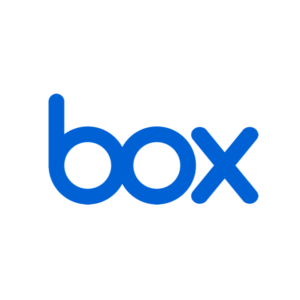
Another Dropbox alternative, box is a cloud storage service for companies and collaborative teams. It comes with various tools and features that can help you optimize your productivity and collaborate with your teams, customers, partners, and vendors more effectively. It’s designed to make your job easier.
Pros
- End-to-end data protection, granular user rights with seven sharing roles, two-factor authentication (2FA) for internal and external users, and multi-layered watermarking for data leak prevention.
- One location for editing, reviewing, and sharing files, as well as task assignment
- There are over 1500 business app connectors (Microsoft Office 365, Google Workspace, Slack, Zoom, and many others)
- Tools for automating workflows (pre-built departmental workflow templates, custom-configured templates, and an intuitive no-code workflow builder)
Cons
- No lifetime storage solutions.
Box pricing plans
For Individuals and teams, Box offers a free plan that includes up to 10GB of storage space and a 250MB file upload restriction. Personal pro plan starts at $14/month and $10/month if billed annually with increased storage and features. Business starter plan costs $7 per user/month and $5 per user/month if billed annually for small teams.
For Businesses, Box offers four paid plans. Business plan costs $20 per user/month and $15 per user/month if billed annually with advanced features. Business Plus costs $33 per user/month and $25 per user/month if billed annually with enhanced security and compliance. Enterprise plan starts at $47 per user/month and $35 per user/month if billed annually with customizable features and support. For the Enterprise Plus plan, Custom pricing is available.
5. NordLocker

NordLocker is a secure cloud storage solution that works on Windows, macOS, Android, and iOS devices. Nord Security, the firm behind NordVPN, NordPass, and NordLayer, created NordLocker.
NordLocker has a robust zero-knowledge policy and uses cutting-edge encryption. NordLocker employs the world’s most trusted encryption algorithms and advanced ciphers to provide complete data protection.
Pros
- NordLocker subscribers get 3GB of free secure cloud storage space.
- Both local and cloud lockers allow you to add files.
- Content backup to the cloud and automatic cross-platform synchronization.
- You can work on your documents and open files directly from your lockers (no decryption needed).
- Money-back guarantee for 30 days.
Cons
- There are no plans for unlimited cloud storage.
NordLocker pricing plans
3GB of safe cloud storage space is included in the free plan. There are two premium options available from NordLocker: 500GB and 2TB.
The 500GB plan is $3.19 per month for the first year and includes priority service 24 hours a day, seven days a week. If you don’t want to commit for a year, you can purchase a $7.99 monthly subscription.
The 2TB package starts at $7.99 per month for the first year-long membership. A $19.99 monthly subscription is also available.
6. OneDrive
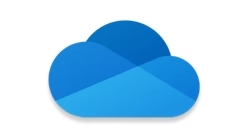
Microsoft’s OneDrive is an easy-to-use cloud storage solution. Its basic package includes 5GB of storage capacity. The best part about Microsoft OneDrive is that if you also use Microsoft Office, the Microsoft 365 Personal plan gives you 1TB of cloud storage plus a complimentary subscription to Microsoft Office (Outlook, Word, Excel, and PowerPoint for Windows and Mac) for only $69.99 per year.
Pros
- Free cloud storage for photos and files of up to 5GB.
- All of your photographs, files, and documents are accessible.
- Easy file sharing with family and friends and the ability to collaborate in real-time on Office files and documents.
- Option to back up your phone’s photographs automatically.
- Advanced sync technology.
Cons
- The free plan does not include ransomware detection and recovery, file restoration, and password-protected sharing links.
- There are no plans for unlimited cloud storage.
OneDrive pricing plans
Microsoft OneDrive offers a free plan with 5 GB of storage and basic features. The Microsoft 365 Personal plan starts at $6.99 per month and $69.99 annually offers 1TB of storage and advanced security features. Microsoft 365 Family plan costs $9.99 per month and $99.99 annually and offers 6 TB of storage that is shared among up to 6 people. The Microsoft 365 basic plan costs $1.99 per month and $19.99 annually and offers 100GB of cloud storage
7. Tresorit

Tresorit calls itself an “ultra-secure” internet storage and sharing solution. Businesses and collaborative teams are Tresorit’s primary consumers, but it also has intentions for individuals. SAP, Deutsche Telekom IT Solutions, D-Orbit, Erste Bank, and other significant brands worldwide use its service.
Pros
- Zero-knowledge, end-to-end encrypted cloud storage.
- Encrypted links provide secure file sharing inside and outside your company/organization.
- Physical security and 24-hour monitoring.
- Available on all mobile devices and web browsers.
- The interface is simple to use.
- Authentication using two factors (2FA).
- Available in a variety of languages.
- 14-day free trial.
Cons
- The free plan does not include ransomware detection and recovery, file restoration, and password-protected sharing links.
- There are no plans for unlimited cloud storage.
Tresorit pricing plans
Tresorit offers one personal as well as three business bundles. The personal plan costs $11.99 per user/month when billed annually. The business plan costs $19 per user/month (billed annually) and starts with 3 users. The professional plan costs $27.49 per user/month (billed annually). For the Enterprise plan contact their sales team
8. Icedrive

Icedrive was established in the year 2019. Despite being new to the market, has already created a solid first impression. The unbreakable Twofish encryption technique, client-side encryption, zero-knowledge privacy, intuitive interface design, and competitive costs are just a few features.
The unique drive-mounting software is one of Icedrive’s outstanding features. This makes your cloud storage feel like a real hard drive without the requirement for synchronization or bandwidth usage.
Pros
- A generous 10GB of cloud storage is provided for free.
- Zero-knowledge encryption on the client side.
- Uninterrupted cloud storage services require a lot of bandwidth.
- Passwords are used to restrict access to shared files.
- Web, desktop & laptop, and mobile & tablet apps that are clean and easy to use.
Cons
- On the free plan, there is no client-side encryption.
Icedrive pricing plans
Icedrive has three premium plans: Lite plan costs $3.99/month when billed annually, Pro I costs $5.99/month when billed annually, and Pro III costs $10.99/month when billed annually.
9. Sync

Sync.com is a Canadian-based collaborative cloud storage business that seeks to make storing data in the cloud more affordable.
It provides free programs for Windows, macOS, iOS, Android, and the web, allowing you to sync and access your files anywhere. Additionally, all Sync plans have a remote device lockout option that you may use to disable your Sync account’s logged-in devices if they are lost or stolen. This improves your security and privacy significantly.
Pros
- All Sync plans include end-to-end encryption and a built-in SOC (System and Organization Controls). Type 1 compliance, file history and recovery, real-time backup and sync, and extensive share controls are just a few available features.
- There will be no tracking by other parties (you are the sole owner of your data).
- Secure links allow you to share an unlimited number of files and folders.
- Offline access and a 99.9% uptime guarantee.
Cons
- Sync.com offers a basic interface and doesn’t provide as many customization options as some competitors.
Sync pricing plans
For Individuals, Sync.com offers a free plan that offers 5GB of storage space. Solo basic starts at $8/month (billed annually). The solo professional plan costs $20 per user/month if billed annually for sole practitioners seeking more storage & custom branding
For teams, Sync.com offers three paid plans. Teams standard plan costs $6 per user/month if billed annually. Teams+ Unlimited plan costs $15 per user/month if billed annually which is for teams of any size, and those seeking advanced storage options. For the Enterprise Plus plan, Custom pricing is available.
10. Mega

MEGA’s free plan has a large storage limit, one of its most prominent features. This is one of the most comprehensive free plans available. You receive 20GB of data storage for free.
Another fantastic feature of this service is the high level of security. You will need to create your encryption key, which will be kept secret even from MEGA staff. Only you have access to the information you’ve saved in the cloud. This service is simple to use, and its apps are intuitive.
Pros
- TLS GDPR compliant for all users globally, end-to-end secured with AES-128.
- Supports two-factor authentication.
- There are both free and premium plans available.
- There is no data stored in the United States.
- There is a lot of storage space available.
- Versioning of files.
- Transparency reports are published every year.
Cons
- Not open-source.
- Complicated Free plan.
- Collaboration options are limited.
- There are no publicly available third-party audits or testing.
Mega pricing plans
As previously indicated, Mega offers a free subscription with 20GB of storage space. If this isn’t enough, you can upgrade to one of their paid plans. Fortunately, you have a wide range of possibilities from which to choose. Pro-Lite is their first premium plan, which gives 400GB for €49.99 per year.
The Pro I plan costs €99.99 per year, the Pro II plan costs €199.99 per year and the Pro III plan costs €299.99.
11. NextCloud
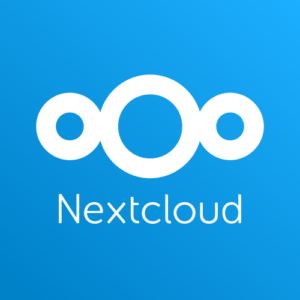
Nextcloud is a self-hosted productivity tool that lets users collaborate on projects, send and receive emails, manage calendars, and hold video conversations without exposing their personal information. You can choose your server to store your files and easily access, manage, share, and sync them. Nextcloud is a complete on-premises solution that allows for collaboration without any compliance or security problems. Its versatility gives you complete control over your data, making it one of the most impressive Dropbox alternatives. You can safeguard, manage, and monitor data and communication across your organization using Nextcloud.
Pros
- File versioning.
- Free and open-source software.
- File sharing is made simple.
- Collaboration.
- A cloud solution that complies with GDPR.
- Personal data management that is integrated.
- Version tracking is an optional feature.
- Integration with third-party apps is an option.
Cons
- Third-party scanning of your system.
- Clunky at times.
- The web interface can be slow at times.
Nextcloud pricing plans
The Basic plan is available for 100 users for €37.49/user/year, the Standard plan is available for 100 users for €67.89/user/year, the Premium plan is available for 100 users for €99.99/user/year and the Ultimate plan is available for 100 users for €195/user/year.
12. MediaFire

MediaFire allows users to simplify workflow and share photos, videos, audio, or docs. You can count on MediaFire for fast and secure storage and collaboration on files. The tool supports a wide range of formats for easy storage of all your files and accesses them from anywhere. Users can also share files through links and the tool also supports bulk uploads and downloads. MediaFire is available across platforms like Windows, macOS, iOS, and Android. Free users get 10 GB storage and up to 50 GB with bonuses. MediaFire is more than a file-sharing and storage tool as it offers a list of handy features to facilitate users with more flexibility and convenience.
Pros
- 10 GB free storage.
- Huge file-size uploads are allowed.
- Great transfer speeds.
- Minimal interface.
- Easy to use for even non-technical employees.
- Reliable and secure platform.
- Cost-effective consumption-based model.
- Regular virus checks.
Cons
- No file encryption.
- Average customer support.
- The app hangs often.
- Very few integrations.
MediaFire pricing plans
The Pro plan is priced at $4/user/month. The Business plan is priced at $40/month for 100 users.
13. Cloudup

Cloudup is a notable Dropbox alternative for businesses and individuals alike. It offers free storage of up to 200 GB, which is more than adequate for users to store their photos, videos, and music. Though the tool is not as flexible and efficient as some other file storage tools, its hassle-free sharing process makes it a serious contender to consider when you go looking for an alternative to Dropbox. Cloudup lets you instantly and securely share anything, without having to wait for uploads or downloads. And, it offers all of that without any additional costs. Cloudup streams can be shared using secure URL links which can even be password-protected.
Pros
- Plenty of free storage.
- Fast sharing using links.
- Password protection.
- Share and view files on any platform.
- Simple drag-and-drop files.
- Instant sharing and uploading without additional costs.
Cons
- Speed can get slow at times.
- Risk of data hacking.
- Lack of adequate support to the user.
Cloudup pricing plans
Completely free with 200 GB storage.
14. Redbooth

Redbooth is another popular alternative to Dropbox. This web-based tool helps teams manage tasks and communication so projects get completed faster and easier. Used by corporate giants like Coca-Cola and Starbucks, Redbooth helps teams manage tasks simultaneously, stay on track with existing projects, and start new ones instantly with pre-built templates. Project managers can stay connected with their teams through iOS and Android apps. Based on the to-do list system, the platform has advanced features and has integrations with apps like Slack, Dropbox, and Gmail.
Pros
- Well-designed user interface.
- Easy to learn and use.
- Low monthly cost.
- Smooth and easy project management.
- Facilitates team collaboration.
- Packed with many thoughtful features.
Cons
- Limited features.
- Limited customer support.
- Weak mobile app.
Redbooth pricing plans
The Pro plan is priced at $9/user/month, the Business plan is priced at $15/user/month, and the Enterprise plan is available on quote.
15. Quip

Quip is Salesforce’s productivity platform that enables enterprises to work together, delivering modern collaboration securely and simply across any device. Its advanced security features help build trust, transparency, and compliance for the most security-conscious organizations. Quip is a collaborative productivity software suite that allows groups of people to create, and edit documents and spreadsheets as a group, usually for business purposes.
Pros
- Quick to set up.
- Easy to use.
- Free version available.
- Supported by Zapier.
- Combines team messaging with collaborative document creation.
- Mobile-optimized.
- Rich communication features.
- Easy access to information.
Cons
- No team calendar.
- The interface could be more sophisticated.
- No rich markup tools.
- Limited integrations.
- Lacks explicit limits on storage space for free accounts.
Quip pricing plans
The Quip starter is priced at $10/user/month, billed annually. The Quip Plus plan is priced at $25/user/month, billed annually. The Salesforce Anywhere Advanced plan is priced at $100/user/month, billed annually.
16. CloudMe

CloudMe is a top-ranking Dropbox alternative for businesses and professionals across the world. It combines cloud storage with the synchronization of data, which allows you to sync your mobile camera roll with your tablet or TV. Apart from that, it also allows users to sync doc files and media across computers and mobile devices. This feature makes it easy for you to share and receive files with friends and colleagues. CloudMe is considered the best cloud/sync storage service in Europe and offers a secure and rich experience across all types of clients.
Pros
- Advanced features.
- Quick downloads.
- Supports Android and iOS.
- Lots of sharing options.
- Servers based on the privacy-focused Sweden.
- File Restoration.
- File backup.
Cons
- The data doesn’t get encrypted with the server.
- Slow upload speeds.
- Max storage limit of 500 GB.
CloudMe pricing plans
The Team plan is priced at €149 per month for 5 users. The Business plan is priced at €279 for 15 users. The Enterprise plan is priced at €759 with 50 users.
17. Zoho Docs

Zoho Docs is one of the most underestimated Dropbox alternatives today. It is versatile and proficient in online file management for teams and individuals. The tool allows you and your team to share a secure and collaborative workspace where everyone can access everything in real time. From documents to images, pictures to spreadsheets, presentations to music and movies, you can carry all your files with you wherever you go. With all your files stored in a centralized location, you can conveniently share them with your friends and colleagues while on the go. Built-in Zoho Office editors allow you to write/edit documents and work in sync with your colleagues. Zoho Docs also lets you create a stunning presentation and publish the same to your audience.
Pros
- Easy file management.
- Acts as an additional drive for your files.
- Highly secure platform for file storage.
- Advanced analytics and reporting.
- Excellent online editing tools.
- File sharing and collaboration are breezes.
- Integrates with Dropbox, Google Drive, and Adobe Sign.
- In-app chat.
Cons
- Per-user fees can add up.
- Steep learning curve.
- Complicated, inconsistent integration.
- Call scheduling is cumbersome.
- The mobile app is missing.
Zoho Docs pricing plans
The Standard Plan is priced at $4/user/month, billed annually for min 3 users. Team plan is priced at $8/user/month, billed annually. The Premium plan is priced at $12/user/month, billed annually.
18. SpiderOak

SpiderOak is strongly recommended as one of the top-rated Dropbox alternatives for businesses because it is the first and only firm to incorporate blockchain technology for security. It is a multiple-user and device backup solution with a centralized management console. When it comes to cloud data management, this tool is fast, reliable, and secure. SpiderOak focuses heavily on advanced security features, including end-to-end encryption and Zero-knowledge service, and is easily one of the most cloud data management platforms available today. The tool is best for those who want more control over the settings and preferences.
Pros
- Top-notch security and privacy.
- Can be used on multiple devices.
- Sync functionality.
- Excellent speed.
- Professional customer support.
- End-to-end encryption.
- Supports an unlimited number of computers per account.
- Well-designed, full-featured desktop application.
Cons
- Expensive.
- No disk imaging.
- No phone or chat support.
- No unlimited plans.
SpiderOak pricing plans
A Free 21-day trial is available. The paid personal plan starts at $69 per year for 150 GB of space. For $115 annually, you can get 400GB of space. For $149 annually, you can get 2TB of space. The largest Personal plan offers 5TB of online storage for a whopping $320 per year.
Understanding the fundamental limitations of Dropbox
To fully realize the need to explore better alternatives to Dropbox, we first need to explore the platform’s limitations. Here are the fundamental limitations of Dropbox:
- Free users are only given a limited amount of storage.
- Expensive pricing compared to its competitors.
- It is cumbersome to organize files and folders within the platform.
- Clunky user interface.
- It is a heavy platform to operate.
- Fundamental difficulties in sharing content.
- Oversaturation of tools leads to overcomplication and clutter.
In Conclusion: understanding the need to find alternatives to Dropbox
Dropbox is one of the most popular cloud storage service providers. It has many features and is convenient for users who need to access their data from any device.
Despite its popularity, there are alternatives to Dropbox that might be better for specific use cases. One example would be Google Drive, which provides similar features without the monthly subscription fee.
In conclusion, while Dropbox is a reliable service that offers excellent features and reliability, some other competitors out there have similar or better features.
FAQs
What can i use instead of Dropbox?
Dropbox is great for sharing and syncing files, but there are alternatives to it that can be used instead. One such alternative is Google Drive which offers similar features as Dropbox does. Another alternative is Microsoft OneDrive which provides similar features as Dropbox does, but it also lets you share files with other Microsoft users.
Are there free alternatives to Dropbox?
Google Drive is a free cloud storage service from Google and is the best alternative to Dropbox. It provides 1 TB of storage space for free and comes with 15 GB of additional free storage space. It also comes with automatic photo backup and a powerful search feature that lets you find your files easily.
What is the best alternative to Dropbox?
One of the best alternatives to Dropbox is Google Drive. It offers free space with 15GB of backup space. Another good alternative is Microsoft OneDrive which offers a free plan with 5 GB of storage.
Is there a cheaper alternative to Dropbox?
The best alternative to Dropbox is Google Drive. This service offers 15GB of free storage space for every new user account and a monthly subscription option that starts at $1.99 per month for 100GB of storage space and goes up to $9.99 per month for 1TB of storage space.
